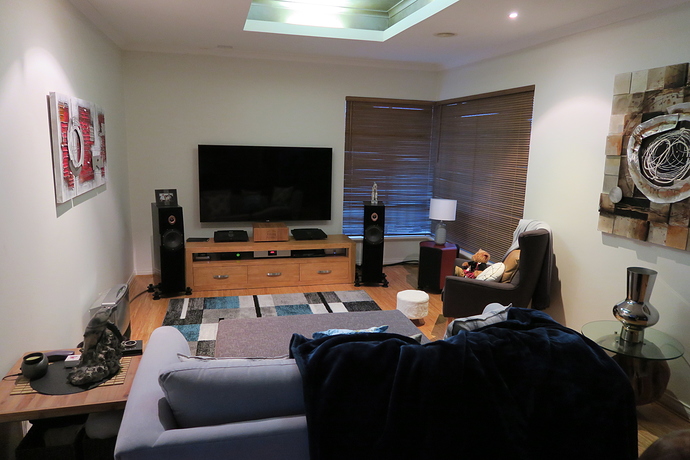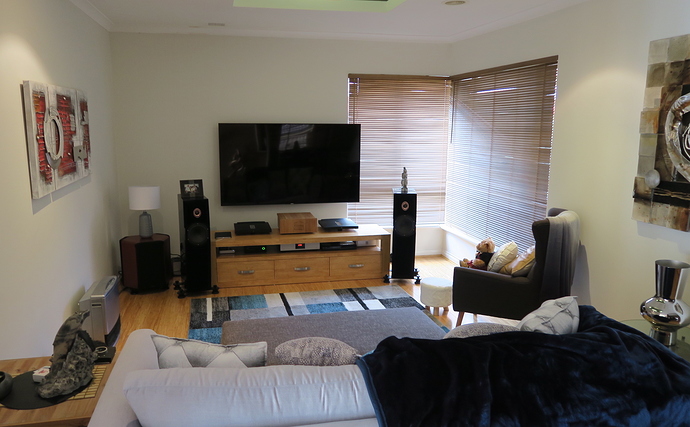Rene
Your post is a great example of when over complicating things can take away not improve. In regards to take away this can also mean taking away the enjoyment as much as the SQ, both need to be properly apportioned.
I got my new Antipodes CX the other week and without going too of track it comes with a duel Ethernet option, but no Wi-Fi. Mark Jenkins feels that this is their best option to clean up the incoming signal before outputting a clean(er) signal to the endpoint (DAC or whatever - in my case a Devialet 1000Pro). No doubt the amount of testing, re-testing, experimentation, etc. Antipodes do it was clear to them that this is the best approach. Off course if someone doesn’t have a hard-wired Ethernet house then this option is pretty much curtailed, and back to Wi-Fi.
As a side note (sorry) and going into room correction(ish), my set-up had my gear sitting to the side of my front room (left speaker 0.5m side wall, but right speaker 1.5m from the opposite side wall). Took measurements in REW and big dip in the 60Hz to 80Hz region. So after talking to a few people on Stereonet forum (a good, friendly forum for us Aussies, actually I’m a ‘Scaussie’ - originally born in Scotland, but moved downunder 30 years ago). So after some chatting it was mentioned best to centralise my set-up (speakers equidistant form side walls). So last Sunday spent a good part of the day having to move my TV (75” so not a 2 minute job, as also had to re-do the wall bracket). After a few choice words (&^%$#) shifting everything around I finally got the speakers nearly centred (Left - 92cm, Right - 93cm, Speakers Apart - 216cm), and shifting the Sub over to the left-hand side (was originally on right hand side, but WAF meant moving also) I sat down to take some new REW measurement and Voila the dip has become deeper, and now is from 40Hz to 100Hz  . This is a very long-winded way of saying what the norm for most may not always be the best approach for others (really would love to hear more about your room correction story, but that would severely take off track this thread).
. This is a very long-winded way of saying what the norm for most may not always be the best approach for others (really would love to hear more about your room correction story, but that would severely take off track this thread).
Going back to Darko and his article, theirs a few people on Devialetchat feel that Wi-Fi for playing Roon Air is actually better than the standard hard-wired Ethernet (cat amongst pigeons for some on there  ). Also the good old ‘KISS’ approach can have as good an outcome for the majority of us Audioph… (I can’t use the full title as I only have limited knowledge in this Hi-Fi ‘Universe’). If your ears say it sounds good then crunching numbers, changing equipment, expending income, and shifting gear doesn’t mean the SQ will improve, but off course it could also (hopefully).
). Also the good old ‘KISS’ approach can have as good an outcome for the majority of us Audioph… (I can’t use the full title as I only have limited knowledge in this Hi-Fi ‘Universe’). If your ears say it sounds good then crunching numbers, changing equipment, expending income, and shifting gear doesn’t mean the SQ will improve, but off course it could also (hopefully).
Very sorry for the massive ramble, but your post was a welcome piece of fresh air for me, as in my current life it’s been rather stale recently – thanks again for the wee uplift : +1:
Cheers
John
PS Keep enjoying the music everyone, it is (or certainly should be) the end goal after all, and everything else before is just the rocky roads of the journey to SQ Nirvana (ok, maybe that was just a wee bit over the top  )
)
PPS Having WAF is VERY important too (happy wife, happy life) and I’ve got a very understanding one (love her to bits  )
)
Before Speaker Move
After Speaker Move

 . This is a very long-winded way of saying what the norm for most may not always be the best approach for others (really would love to hear more about your room correction story, but that would severely take off track this thread).
. This is a very long-winded way of saying what the norm for most may not always be the best approach for others (really would love to hear more about your room correction story, but that would severely take off track this thread). ). Also the good old ‘KISS’ approach can have as good an outcome for the majority of us Audioph… (I can’t use the full title as I only have limited knowledge in this Hi-Fi ‘Universe’). If your ears say it sounds good then crunching numbers, changing equipment, expending income, and shifting gear doesn’t mean the SQ will improve, but off course it could also (hopefully).
). Also the good old ‘KISS’ approach can have as good an outcome for the majority of us Audioph… (I can’t use the full title as I only have limited knowledge in this Hi-Fi ‘Universe’). If your ears say it sounds good then crunching numbers, changing equipment, expending income, and shifting gear doesn’t mean the SQ will improve, but off course it could also (hopefully). )
) )
)
